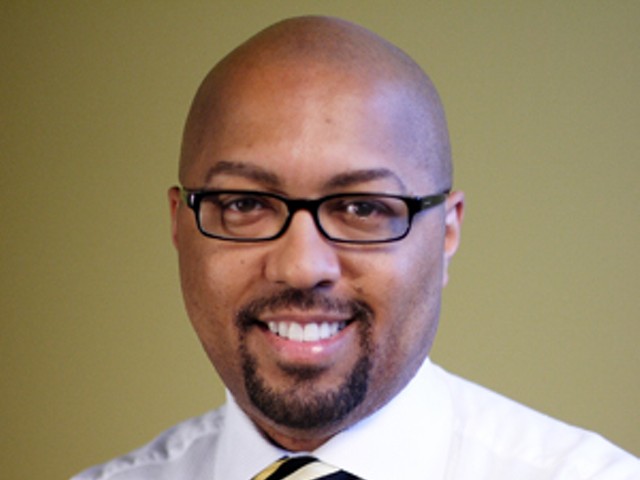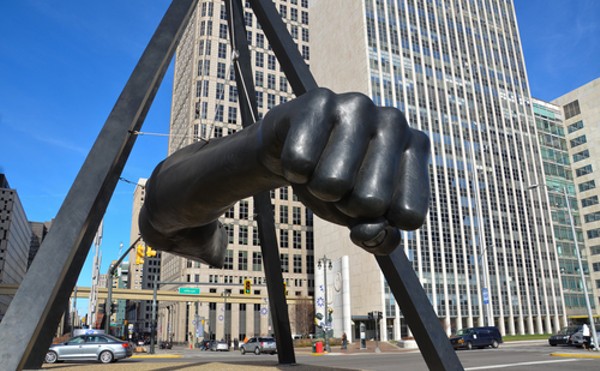About 50 percent of the city's $1.8 billion general fund budget is spent on salaries and benefits. Is there a way to address an accumulated deficit of at least $300 million and avoid the risk of insolvency without significantly reducing those worker costs? If not, by what percentage overall do you think they should be cut?
I do not believe that we can address the deficit without reducing worker costs. The question is how significant the cuts will look like and how do we accomplish it without increasing the burden on government which will almost certainly be required to fill the gap created by the cuts in areas such as health care, dental care, disability costs, etc?
I am not certain what overall percentage because I have not had the opportunity to review or have an analysis of the cost structure for city workers done.
Do you have any other ideas as to how the city can either significantly cuts costs or raise revenue?
The city of Detroit (government) must embrace the notion that the city must be right-sized; it is a difficult notion to hold on to but we must embrace the fact that our government is too large for the population it serves. Having said that, the city of Detroit must consider monetizing certain assets such as public parking in order to raise the revenue we need to provide basic city services and keep a balanced budget.
Long term revenue generating plans must include a comprehensive plan to re-build entire areas in order to bring in tax revenue; as a developer I believe firmly that the city of Detroit can and should embrace the idea of partnering with the private sector to build towns within towns where entire areas can be planned from the ground up to include residential, commercial and the infrastructure for city services such as police and fire that can be leased long-term to the city. By building new towns within Detroit similar to what Highland Park used to look like but at the same time remaining a part of corporate Detroit and its tax base; with this idea we will be able to attract folk to move to these completely new urban landscapes outfitted with mainstreets as the center of commerce and cultural venues for these new neighorhoods, thus increasing the property tax revenue base for the city.
I also believe that Detroit must develop a comprehensive long-term plan to re-invent itself as a hub for an industry or two that could bring jobs and other economic development activity to Detroit; a suggested industry should include the health care industry.
Would you support changing Detroit's city charter to allow district elections for some or all council members?
Yes I support changing the charter to provide for election of council members by district and all of the other necessary changes that will be required to make the change work.
The Detroit International Bridge Co. is attempting to purchase a section of Riverside Park so that it can build a new span adjacent to the Ambassador Bridge. At the same time, a publicly owned bridge is being planned for the Delray area. Explain your support for or objection to each plan.
I do not support the plan that would eliminate the Riverside Park. It appears that there is a majority of support from Detroiters, Canadians and the Federal government for the Delray plan; from all indications it is the plan that would work best for the most people.
The City Council has twice voted to send the city's trash to landfills instead of the incinerator, and is exploring its legal options in an attempt to make that happen. The administration, meanwhile, is considering purchasing at least a share of the facility, and possibly all of it. As a council member, would you support or oppose continued use of the incinerator?
Primarily due to health and environmental concerns I oppose the continued use of the incinerator. I also believe that most experts believe that landfilling is a les expensive and certainly environmentally friendly method of handling trash.
Given the city's fiscal crisis, what, if anything, would you do as a council member to help support the arts and culture in the city?
I am a jazz fanatic and the arts are extremely important to me; my daughter (15) sings jazz as well. I know that any and every city world-wide is better off when they become a destination for the enjoyment of all the arts. As a council member I would do everything I could to support the arts and if fiscally possible fund the arts. At every opportunity I would permit my office and the public platform I will be afforded to promote the arts.
What have you done personally or professionally to help advance civil rights, regional cooperation, race relations, poverty reduction, pro-environmental efforts, or any other similarly significant cause?
In my personal and professional life I have worked with several organizations including the alumni chapter of my fraternity to advance the reduction of poverty, hunger and promote literacy. As an attorney I have a pro bono policy to provide legal representation of at least one church or non-profit organization annually. As a real estate developer my company and its' partners have worked with several community development organizations such as CDCs to build affordable housing in Detroit.
As a council member, what could you do to help Detroit capitalize on the burgeoning green economy?
I believe that Detroit, Wayne County, and the State of Michigan should embrace the "green" industry as one of the industries that can bring economic development to the city. As a council member I will invite industry leaders to come to the table to help me and my council colleagues formulate the right policies, ordinances, laws and incentives to encourage the development of a green industry in the region.
What innovative ideas do you have in regard to dealing with the massive amounts of vacant and abandoned property in Detroit?
As a developer I whole heartedly embrace the re-development of vacant land within the city as towns-within-towns with main streets as centers of commerce for the neighborhoods as described above. I also believe that large parcels of land can be re-developed as new industrial areas.
With respect to demolition and rehabilitation of property I would work to strengthen existing laws that hold negligent property owners responsible for blighted and dangerous structures. I would also promoted and do my best to convince my council colleagues to ensure the funding of all programs created by the city to promote nuissance abatement and the housing of homeless people in viable structures.
The city of Detroit should also step up its efforts to use its stock of housing to promote first time homeownership and as an incentive to keep city workers in Detroit as well as attract others to return thereby placing property back on the tax rolls.
Lastly, I would work to encourage my council colleagues and the city's administration to market city owned vacant lots and abandoned property to developers who will actually develop the property and put it back on the tax rolls. I would propose tax incentives for developers who actually develop property and penalties for speculators who purchase property with no intent or visible efforts to develop the property. These penalties would not apply to any current vacant lot owners who have purchased lots under certain city of Detroit programs that encouraged folk to purchase neighboring lots or other nussiance abatement programs.
Name one of your favorite movies about politics? What is it about this movie that made an impression?
Probably "Mr. Smith goes to Washington". I tend to be a little idealistic and hopefull and this movie as always moved me in sort of a naïve and hopefull way where a regular guy is able to stand up for his principles without wavering; I know it a little sappy is sort of a black and white movie way but I like it anyway.
What book dealing with politics or government — either fiction or nonfiction — would you recommend others read? Why?
Mindful Politics: A Buddhist Guide to Making the World a Better Place by Melvin McLeod (Editor)
I enjoyed the book because I like the varying approaches outlined by the numerous contributors to the book. The viewpoints contained in the book are thoughtful and sometimes provocative but all of them make you think about not just politics but also the social issues we are confronted with as a society.
What piece off music (other than Marvin Gaye's "What's Going On,") has affected you in a political, moral or social sense? Please explain why.
I am jazz guy and John Coltrane's "A Love Supreme" is usually the music that I play whenever I am in a mindful mood to think about or read about politics; a the heart of the matter for me is whether or not we can approach life, politics, religion, race, social issues with a love ethic and if not we are in trouble. Coltrane's "Love Supreme' constantly reminds me of this love ethic that is so missing in society politically, morally, socially and far too often religiously.
13. What question should have been included in this, but wasn't? And what would your answer to that question be?
That question would be "What was the most significant, life changing event in your life?
My answer would be to describe an incident that happened to me more than 25 years ago in Hillsboro, Kansas where I attended college for three years. During my second year there I was charged, arrested, tried and acquitted of a crime that I not only did not commit but could not have committed because I was out of town more than two to three hours away from school for the weekend. As a result of that incident I decided not to pursue a career in medicine but instead pursued a legal career. It was during that period of time that I began to understand the precariousnes of life as a black man in America and I developed a stronger resolve to make a difference in my community.






